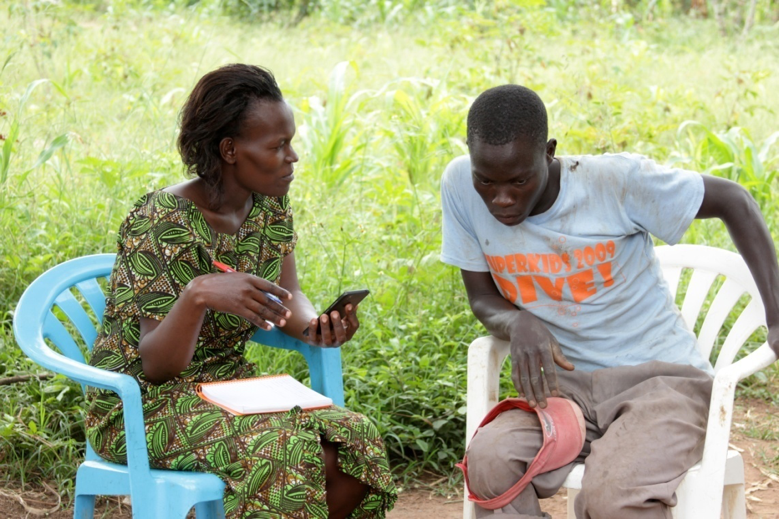
Learning from Answering Questions: How the Research Process Benefits Respondents
Through conducting the research for Invisible Lives: Understanding Youth Livelihoods in Ghana and Uganda it was confirmed that diaries research can contribute to real change for respondents and researchers. The research process can be a transformative one, helping participants reach new levels of awareness, face new questions, and identify gaps in their understanding. Through self-reflection and iterative engagement with the researchers, these gaps can gradually be filled.
For complex behavioural issues, ones where other programmes have had limited success, diaries can have a positive impact on respondents.
Just some simple questions
How will you ensure youth stay with the research? How will you motivate them to answer the same questions every two weeks for a year? Don’t they need to be paid?
These were some of the questions asked in the design phase of the research for Invisible Lives: Understanding Youth Livelihoods in Ghana and Uganda. L-IFT – a research company dedicated to diaries research and commissioned by the Mastercard Foundation, to implement youth livelihood diaries – had the answers. Having completed three other diary-style projects, they knew that respondents remain engaged because of the insights they gain into their own behavior which helps them improve their lives.
From April 2015 – April 2016, a team of 15 young L-IFT researchers, interviewed 248 young respondents in Ghana and Uganda, every two weeks about how they generated income. The project produced a wealth of data and some surprising findings.
At the end of the research, during an evaluation interview, 96 percent of respondents in both countries, expressed that they felt very positive about the research and would recommend it to others. L-IFT investigated respondents’ journey participating in the diaries research: what do they enjoy about it and what do they learn?
How the respondents experience the research
During the first two interviews, participants learn about the research objectives. Respondents were made active research partners, steering the research towards issues important to them. They were explicitly invited to recommend themes and questions and told they could influence development programmes and even government policies. Even though no meaningful compensation was offered, respondents were overwhelmingly interested.
In exit surveys and reflection activities, respondents explained that a personal transformative process was set in motion by the simple act of answering questions. Over time, they reported a changing relationship to the research questions. They described certain stages of development:
Stage 1: When respondents first heard a question such as, “have you sought advice from someone,” many reported feeling overwhelmed and uncomfortable because they had never thought about the issue. In the first interview, they often had trouble answering, reporting that they didn’t view their common everyday conversation with neighbours and friends as seeking advice.
Stage 2: Two weeks after the first interview, a new-found process of reflection and engagement was expressed by the respondents. They started to critically assess their own behaviours. Conversations with friends and neighbours were now seen in a new light. They became aware of the information and advice they were seeking, why they sought it, how often they asked for it, and from whom. By the second or third interview, the respondents’ relationship to this question changed almost entirely and they were able to answer it more accurately.

A researcher and respondent enjoying their interview time together. The interviews each week help her learn more about herself.
Stage 3: After four or five interviews, about ten weeks into the research, many respondents began to actively question their own behaviour and wondered for instance, why they sought advice on some topics while not others. Respondents began to consult different people for advice on a wider range of subjects. They tested these opinions, assessed their value and subsequently made up their minds1 regarding their worth.
Participants reported that the interview process helped them organize their thoughts and feel more calm and confident about financial issues. Some respondents expressed that the very act of putting their experiences into words helped them understand their situation better.
Stage 4: Building on this stage of self-awareness, respondents started to identify ways to improve their situation. They became aware of alternatives to their own behaviour. Several of them started to experiment with new approaches such as rearing small livestock as a new way to save. See story below.
Stage 5: Partly with the help of the diaries interviews, those who experimented could monitor whether their new behaviour worked to their advantage. The interview every two weeks served as a moment to take stock and assess whether there was an improvement. For instance, some respondents actively asked their usual employers for casual work and when they would be hiring. The respondents learned to treat employers as a customer and did efforts to understand their needs as a customer. It resulted in a better relationship with these employers.
The contribution diaries research can make to development
Through self-reflection and iterative engagement with the researchers L-IFT has seen how diaries research can contribute to change for respondents. Moreover, young people who are most excluded and vulnerable – invisible to policy makers, extension services and financial service providers, may have the most to gain through a diaries approach.



